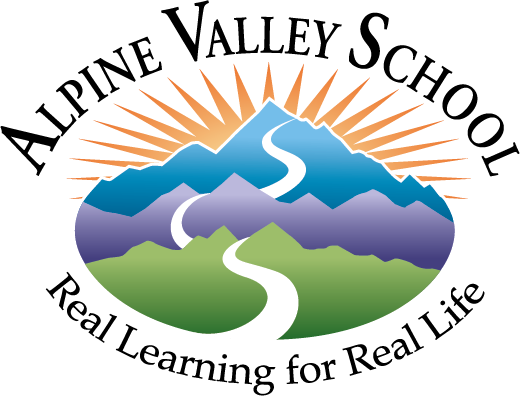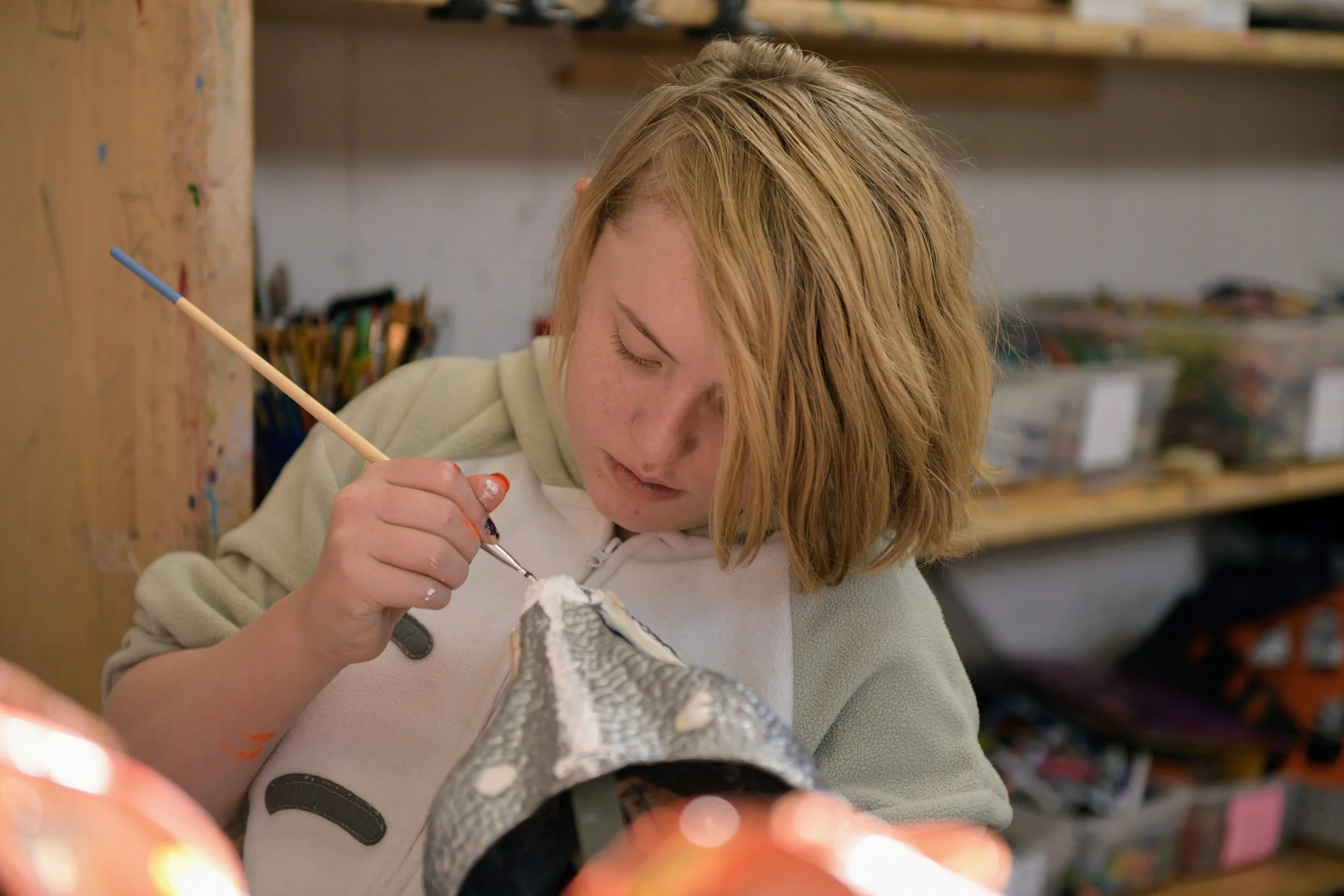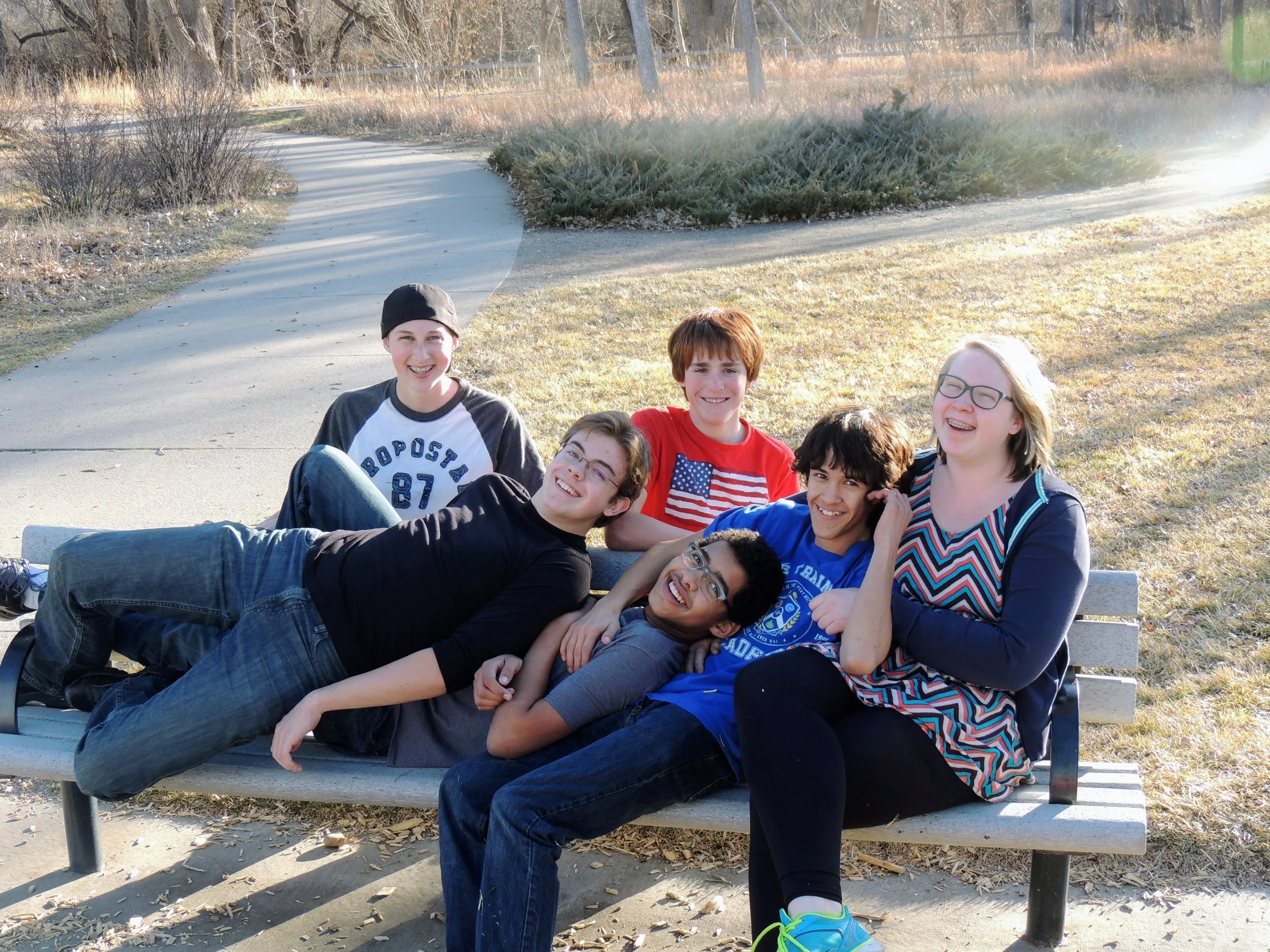Self-Directed Democratic Education
Student-Directed Learning
Children choose what, when, and how they learn based on their interests and developmental readiness. There are no required classes, tests, grades, or homework. Instead, learning happens organically through play, conversation, projects, and exploration—the same natural way humans have learned throughout history. When a child becomes genuinely interested in reading, math, science, or any subject, they pursue it with intensity and joy. This intrinsic motivation leads to deeper, more lasting learning than external requirements ever could. Students might spend months mastering video game design, years exploring music, or weeks diving deep into history—following their natural curiosity wherever it leads.
Students and staff share equal voice in creating school rules and resolving conflicts through our School Meeting and Judicial Committee processes. From age 5, children participate in real decision-making about their education and community. They propose and vote on rules, serve on committees, and handle conflicts through a fair judicial process where everyone—regardless of age—has equal standing. This isn't mock democracy or student council; it's genuine self-governance where young people experience authentic responsibility and learn that their voices matter. Through this process, children develop exceptional communication skills, learn to advocate for themselves, and understand how democratic societies function.
Democratic Governance
Mixed Age Community
Our students ages 5-18 learn together in one diverse community, creating natural mentoring relationships and authentic social interaction. Unlike traditional age-segregated classrooms, children interact with the full spectrum of human development daily. Older students naturally guide younger ones, while younger children inspire creativity and wonder in their older peers. This mirrors real-world social structures where we work and live alongside people of all ages. Research shows this multi-age environment develops empathy, leadership skills, and communication abilities that serve students throughout their lives. The result is a community where everyone teaches and everyone learns, regardless of age.
Prof. Peter Gray's quick primer on the basics of Self-Directed Education (SDE) -- from the Alliance for Self-Directed Education (ASDE)
Graduation & Future Prospects
This model is based on 50+ years of outcomes from Sudbury Valley School and similar schools worldwide. Research shows graduates of programs like ours:
Attend college at typical rates when they choose to
Develop strong critical thinking and communication skills
Maintain intrinsic motivation and love of learning
Become confident, self-directed adults
Graduation from Alpine Valley School
At Alpine Valley School, graduation is a deeply personal journey of self-reflection. Students declare their intent to graduate and work with our Diploma Committee through meaningful conversations exploring their personal growth, learning, and passions. The process culminates in a public ceremony where graduates share their reflections with the community – many describe this as transformative because they're articulating their own discoveries about who they are and what they care about. What makes this so meaningful is that students aren't graduating because they've completed someone else's checklist, but because they've discovered their authentic selves and how they want to show up in the wider world.
In order to receive a diploma from Alpine Valley School, students must:
Be at least 17 years old by the time they would graduate
Have attended AVS continuously for at least three years
Maintain a record of regular attendance during their enrollment
Interviews with our graduates:
Common Questions
"But what about math, reading, and basic academics?"
Children master academic skills when they need or want them, often more thoroughly than through forced instruction. Reading typically emerges naturally through gaming, texting, and pursuing interests. Math develops through real applications: cooking, building projects, managing money, or gaming. When students encounter genuine need for academic skills, they learn rapidly because they're internally motivated. Research from Sudbury schools shows graduates perform as well as traditionally-schooled peers on standardized tests when needed for college admission, despite some students never taking formal classes.
"What about socialization and learning to follow rules?"
Mixed-age interaction provides far richer social learning than age-segregated classrooms. Students develop empathy by caring for younger children, leadership by guiding peers, and respect by interacting with older students and adults as equals. Our democratic governance teaches rule-following through understanding rather than blind obedience—students help create the rules they follow. The Judicial Committee process develops conflict resolution skills and personal responsibility. Graduates consistently demonstrate exceptional social skills and ethical reasoning because they've practiced authentic relationships and democratic participation daily for years.
"How do they learn responsibility and work ethic?"
Students experience genuine responsibility from day one: managing their time, resolving conflicts, participating in school governance, and living with real consequences for their choices. Unlike artificial rewards and punishments meted out by adult authority figures, self-directed students develop internal motivation through pursuing meaningful activities. When children follow their passions, they naturally develop strong work ethic—spending hours perfecting skills they care about. This intrinsic drive transfers to any endeavor they choose as adults, whether college, career, or personal projects.
"What if my child just plays video games all day?"
Gaming often serves as a bridge to deeper learning: strategy development, problem-solving, reading, math, social interaction, and sometimes programming or game design. Most students naturally diversify their interests over time as they mature and discover new passions. The key is trusting that children have an innate drive to grow and learn. Staff are available to engage with students about their interests and help them explore related opportunities when they're ready. Many graduates credit their gaming experiences with developing valuable skills and career interests.
"How does this work for neurodivergent students?"
Neurodivergent students often thrive in our self-directed environment because it removes many traditional school stressors that create challenges. Without forced curriculum, rigid schedules, or sensory-overwhelming classrooms, children with ADHD, autism, anxiety, or learning differences can learn at their own pace and in ways that work for their unique brains. They're free to move, take breaks, pursue intense interests, and avoid many situations that cause distress. Our mixed-age community is naturally accepting of different learning styles and behaviors. The democratic process teaches self-advocacy skills while building confidence through genuine participation. Many families find our low-demand environment allows their children to heal from school-related trauma and rediscover their love of learning. However, it's important to note that while we're supportive of all learners, we are not a therapeutic program and don't provide specialized interventions or clinical support.
"What is the role of teachers at Alpine Valley School?"
Staff members aren't only teachers in the traditional sense—they're facilitators, mentors, and community members who support student-led learning. Our five staff members bring diverse expertise and backgrounds, from art and history to conflict resolution and theater. Rather than delivering curriculum, they engage authentically with students, answer questions when asked, and help connect children with resources they need. Staff participate equally in our democratic governance, model respectful relationships, and ensure the physical and emotional safety of our community. They might play board games with younger students, discuss philosophy with teens, help resolve conflicts through our Judicial Committee, or simply be present when children need adult support. The key difference is that staff respond to genuine student interest and need rather than imposing predetermined lessons. This creates natural mentoring relationships where learning happens through shared interest and curiosity rather than authority and compliance.
At Alpine Valley School we are often asked what a “typical day” in self-directed democratic education looks like. This video is our attempt to answer this question, along with testimonials from each of our staff members. Get a rare peek inside Colorado’s first Sudbury School and see just how amazing learning can be.



